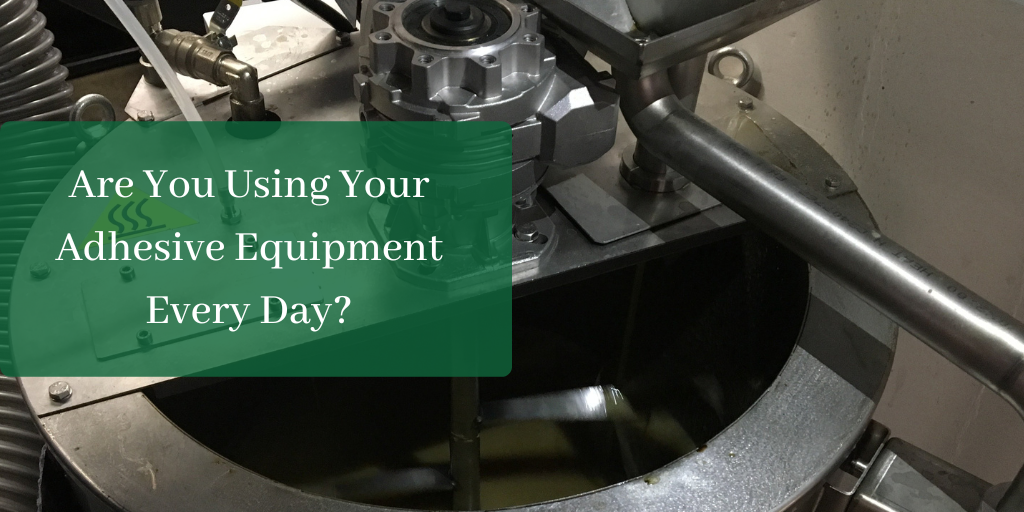Adhesive application is critical for many manufacturers. We work with many companies that use adhesive and apply it in specific ways using different machines.
Every manufacturer has their own nuances when it comes to production. Our team has helped troubleshoot glue application challenges regardless of what equipment they use.
In this article, we will cover the best practices manufacturers can use to keep their adhesive equipment clean so production can continue to run smoothly.
Best Practices for Keeping Adhesive Equipment Clean
Find your specific equipment below or browse them all to better understand how to maintain adhesive equipment.
SS/FMC/Crathern and Emmeci
These systems are all unique, but the tips below will help increase their efficiency and functionality.
Daily Use
- Reduce the heat on the glue tank when not in production. This will reduce/eliminate glue burning.
- When adding glue during your production run, add smaller pieces a little at a time not to affect the glue’s viscosity.
- Keep the glue tank as full as possible but not above the water level in the glue tank.
Cleaning
- Run enough water to flush the entire system when washing up your machine.
Routine Maintenance
- A few times a year, preferably over a long holiday weekend, run the glue down low, and at the end of the day, fill the tank to the top with water. When you return, pump out the water, rinse the tank, and fill it with new clean glue.
GP2 Machines
End-of-Day Use
- Lower the glue pan. This allows for a cleaner start-up the next day.
- The glue skin can be mixed into the melted glue rather than it wrapping around rollers and shafts when started.
- Check so that no un-melted chunks of glue have adhered to the roller faces. When the roller is left in the glue pan, and the glue is melted for start-up, there might be residual dried chunks of glue on the roller faces.
Glue Tank Maintenance
- Keep your glue tank Levels filled appropriately.
- Don’t overfill the glue tank, as this can result in an overflow situation when water is added. Keep a minimum of ½” clearance between the Edge of the Tank and the Glue Level.
- Adding glue every 200 covers manufactured reduces changes in the Glue Tank fill level. As glue is used, the tank level drops, leaving a coat of glue that will burn to the side of the tank. The larger this level differential occurs, the more burnt glue will accumulate on the side of the tank and have to be scraped off at some point.
- Flush the Glue Pump at the end of every day.
- Leaving glue in the pump at the end of the day will cause issues with the diaphragm and the viscosity control system not working properly.
- Flushing the pump assists with adding water to the glue at the end of the day will help the glue lose moisture overnight and have close to the appropriate water content the next day.
Roller, Scraper, and Pick Maintenance
- Make sure the Glue and Doctor Roll Face Scrapers are installed and adjusted correctly.
- The Scrapers are used to prevent excess glue from accumulating on the face and shafting of the Rollers.
- Replace worn and damaged Picks.
- Worn and damaged picks will damage your cover material or fail to peel the Cover Material from the Rollers during operation.
For additional machine information, check out the manufacturer.
Kolbus Casemaker and PotDevin Machines
Daily Maintenance
- Always use fresh glue and keep the machine as clean as possible.
- The machines should be completely cleaned daily. We recommend using M12 Release Cote.
- M12 Release Coat is a compound that prevents coats, like protein glue, from sticking to the walls of pots, ink fountains, pray booths, tanks, and exposed surfaces. It can be applied to spray on any exposed surface where coating build-up occurs.
- At clean-up time, after reservoirs are drained, the residue is removed by a simple stripping operation. The Release Coate puts an oil-based coating between the glue and the tank, allowing for an easier rinse.
For additional information, check out the manufacturer and our past PotDevin article.
Keeping Up with Routine Maintenance
Maintaining adhesive equipment is often a daily requirement to keep them running optimally. If you’re performing cleaning regularly and are still having issues with your equipment or glue application, let us know, and our experts can point you in the right direction.



